


ENERGY MANAGEMENT
We know the importance of energy conservation and that renewable sources provide climate solutions. For this reason, we are committed to reducing carbon emissions by using solar water pumps, building employees’ outposts supplied 100% by renewable sources and using wind energy to supply one of our farms in the province of Santa Cruz.
Energy consumption in CRESUD’s activities is mainly associated with the use of diesel in agricultural machinery and water extraction for cattle, which accounts for 72% of the energy used. The remaining 28% corresponds to purchased electricity
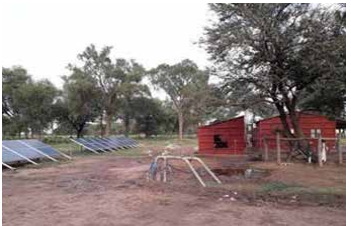
Solar system at la armonía outpost, Los Pozos farm: We installed an integrated solar system at the La Armonía post in our Los Pozos farm, in northern Argentina, eliminating the need for a generator and drastically reducing diesel and lubricant consumption. The integral solar system is composed of a solar panel module, which provides energy to a specific pump designed to supply the required flow, according to the daylight hours for that latitude. In addition, a solar panel module plus a solar kit consisting of an inverter, a set of batteries, a regulator and a control panel generate energy for domestic use (LED lights, two air conditioners, refrigerator), where the surplus solar energy is stored in the batteries to be used that way during the night. In this way, the generator set will only be used in the event of many cloudy days, in case it is necessary to reinforce the charging of the batteries or in case of any breakage or malfunction in the system.
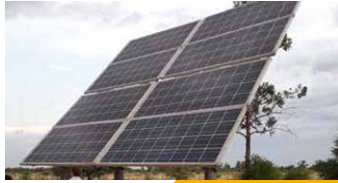
Rent for the renewable energy project at the 8 de Julio establishment: The project consists of renting a large part of the area of the 8 de Julio farm for a maximum term of 12 years (with an option to purchase), with the objective of installing wind turbines to produce wind energy, as well as a water hydrolysis plant to produce hydrogen and derivatives (ammonium and ammonia), without affecting the Company’s wool production at that farm. To this end, we signed a contract with a third party in August 2022, which contemplates different stages of the project. During the first three years, the analysis of the technical and economic conditions to move forward with this project will be carried out.
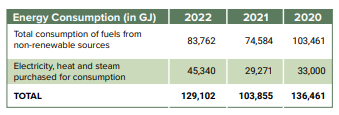
The measurement of energy does not include that from renewable sources since the solar panels that we implement in some of our farms are pilot tests of a smaller scope. We will advance in their measurement in the future as we increase renewables in our energy matrix.
WATER MANAGEMENT
Water is a very valuable resource for our activity; therefore, efficient use and preservation of its quality is part of our commitment. Water is collected from the water table, with the proper authorizations, and is used for animal consumption as well as for spraying and administrative activities.
In order to know the quality of water for productive, domestic and irrigation use, and to control the quantity used, monitoring is carried out through the analysis and dynamics of the water table, the identification of water source points and the installation of phreatimeters. At the same time, preventive maintenance of the facilities and surveys of the condition of the sprayers are carried out to prevent contamination of the groundwater. In two of the Company’s own farms, drip and sprinkler irrigation systems are applied, optimizing and improving the application of fertilizers and products.
Sprinkler Irrigation Equipment: In Agroriego, an agreement was signed with the municipality of Merlo for the use of treated effluents from the neighborhood near the Santa Bárbara farm. The effluents treated in the neighborhood are piped to the farm, where they are used to irrigate a forest curtain along the road.
Water project at estancia La Suiza in Chaco: Change of 100% of the water storage tanks, installation of filters and chlorinators. Training talks on the project for farm personnel, with delivery of material for food sanitization, personal hygiene and equipment maintenance. Water use in most of our farms comes from rainfall, the consumption of which was estimated according to the yields of our crops and livestock stock. As a result, water consumption indicators are much higher than water withdrawal indicators.
Water use in most of our farms comes from rainfall, the consumption of which was estimated according to the yields of our crops and livestock stock. As a result, water consumption indicators are much higher than water withdrawal indicators. Does not include rainwater.
Does not include rainwater.
WASTE MANAGEMENT
Our waste management plan includes the tasks of classification, collection and transfer to the appropriate destination according to the type of waste. In addition to complying with the requirements of the legislation, in our farms we are committed to classifying as many materials as possible:
Recyclable Material: We work with cooperatives and local treatment plants in order to recover as much of the materials generated in the activity as possible, as well as in the administrative offices and homes. We prioritize the reuse of materials (such as silo bags and pallets).
Wet Waste: We promote the 3R initiative, prioritizing the reduction of waste of all materials that cannot be reused or recycled.
Phytosanitary Containers: We have warehouses exclusively for the temporary storage of containers. We make our contractors and our own personnel aware of the importance of triple washing containers and perforating them to make them unusable. In this way, we avoid their inappropriate use, which could be a risk to health and the environment. The containers are taken to the authorized CAT (Transitory Storage Center), where they are transformed into inputs for the industrial circuit.
Special or Hazardous Waste: Although generated less frequently as a result of the maintenance of machinery or facilities, this waste is removed by companies authorized to transport, treat, and dispose of it.
Organic Waste: All food waste from the preparation of meals in the farms, as well as that generated in the offices, is composted on site in compost bins made from recycled material. The compost is used in the gardens worked in the farms, producing food consumed by the employees or for landscaping around homes and offices. Also, visits are made to school students in order to teach them how to assemble and care for the compost, so that they can implement it in their homes or institutions.
THROUGH DIFFERENTIATED WASTE MANAGEMENT, WE CONTRIBUTE TO LOCAL ECONOMIES BY WORKING WITH NEARBY COOPERATIVES AND TREATMENT PLANTS. THESE COOPERATIVES ARE SUPPORTED BY THE SALE OF MATERIALS AND RECEIVE AN INCOME FOR THEIR FAMILIES.
Each farm administers the management documents by type of waste, according to the local legislation in force. The farm administration files the documents and shares them with other areas for reports or necessary actions. The Environment Area keeps the annual record of generation and channeling of waste streams to plan improvements. Annually, the data generated is used to evaluate compliance with objectives and plan for the following year with proposals for improvement.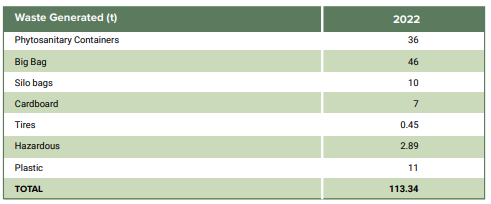
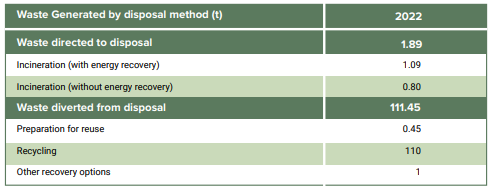 Thanks to the separation of organics, we reduced 40% of the wet waste that we generate in the farms.
Thanks to the separation of organics, we reduced 40% of the wet waste that we generate in the farms.
We promote projects that seek the circularity of materials or resources:
“El jote” municipal solid waste treatment plant: In our farm in San Luis, Agroriego, we have been working for more than four years with the MSW treatment plant, called “El Jote”. We are in constant communication, which allows us to be aligned and incorporate into the recycling circuit new materials that have value as an input for the industry. In January 2021, personnel from the El Jote plant visited our farm. The purpose of the meeting was, in addition to getting to know the farm, to learn about its activity and the actions carried out with the community, and to identify other materials that are not currently being recovered and may have potential for recycling (such as plastic bags from some agricultural inputs).
DURING FISCAL YEAR 2022, 111.45 TONS OF RECYCLABLE MATERIALS WERE RECOVERED, CORRESPONDING TO SILO BAGS, BIG BAGS, CARDBOARD, TIRES, HOSES, PLASTICS, ETC.
In the farms of Salta, we began with the classification of recyclable waste, in support of municipal projects regarding the use of different materials, as is the case of the town of Las Lajitas (department of Anta), which has a green point to take recyclable materials.
A public-private agreement was signed at the San Pedro farm, in the province of Entre Ríos. A novel initiative that marks a commitment for the correct final disposal of recyclable waste. The waste generated in the farm is taken to the Santa Anita MSW Treatment Plant for classification. The plant is run by a group of women who have formed a cooperative and earn an income from the sale of the materials.
We developed a project together with the triple impact company Siclo Rural, who collected used silo bags from three of CRESUD’s own farms (El Tigre, in La Pampa and Los Pozos and Anta in Salta). In total, 4 tons of plastics from silo bags were removed. For the plastics collected, 200 trees were planted in burned or reforested forests, and a total of $75,000 was donated on behalf of CRESUD. Based on this successful experience, we are evaluating the possibility of continuing in the aforementioned farms and extending it to our other farms.
ENVIRONMENTAL COMMUNICATION AND TRAINING
During 2022, we continued training in environmental matters, both virtually and in person at our farms. We developed a training program on waste management, efficient use of resources such as water and energy, both for our own and contracted personnel, which we adapt to the conditions of each specific farm.
We design technical content to share in talks with employees and suppliers, which we also communicate through the Company’s internal social network and posters in the farms; we propose contests and reflections to raise awareness of the need for each person to participate.
Training is provided by our technical team. Therefore, it is necessary to invest in training and continuous updating on the evolution of climate change and associated impacts, as well as new certifications and strategic management for sustainable development. During this fiscal year, employees of the farms, managers and invited suppliers received training on carbon balance.